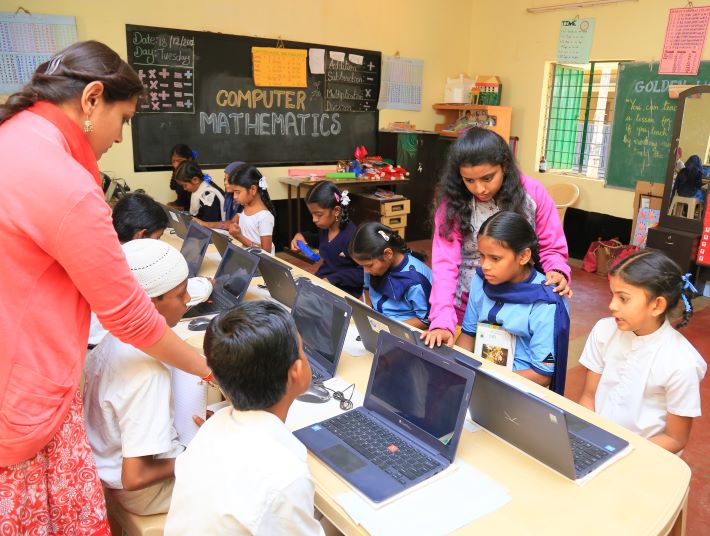Corporates have a role to play in enhancing teacher training and support in government schools
Globally there is a shortage of teachers, according to the World Economic Forum, which is a significant roadblock in achieving UN Sustainable Development Goal 4 (free and quality education for every child by 2030). Not only does it impact the individual attention each child receives, but it also leaves educators overworked and has an additional financial burden on already strained education systems.
A report from UNESCO in 2021 found that India suffers from a shortage of over one million teachers in schools. Further, around 1.1 lakh schools in India are single-teacher schools. Across the country, 19% of all teaching positions were vacant, with that number showing as high as 69% in rural areas.
Teacher training is a strategic investment in the intellectual capital of our society. It equips educators with the necessary tools, methodologies, and insights to navigate the complexities of the modern classroom effectively. Teachers in government schools often face overcrowded classrooms, limited resources and diverse student populations. To overcome these challenges, there is an opportunity to contribute to the enhancement of teaching quality and student learning outcomes by investing in teacher training programmes, creating professional teaching standards, instituting accountability towards learning outcomes through assessment reforms, strengthening the governance structure with the schools, and taking into account their voices when designing and instituting policies.
Impact of teacher shortages on the education system
With its diverse socio-economic landscape and urban-rural divide, Indian education already faces several massive challenges, which hamper the provision of quality education equally. A shortage of teachers already contributes to the widening educational gap.
Put simply, fewer teachers in schools means fewer opportunities for students to learn critical skills that would help them join the future workforce.
How CSR can help
The role of corporates in CSR can extend beyond one-time initiatives. It can encompass sustainable, long-term partnerships aimed at creating meaningful impact. Through strategic collaborations with educational institutions and NGOs, corporates can establish enduring support systems for teachers in government schools. This support can include the supply of educational materials and technology, as well as opportunities for professional development and career advancement.
1. Improving Infrastructure and Facilities: Corporates, in collaboration with the government, can step up and support the education system. One of the major ways is by providing teachers and students with an environment conducive to learning—excellent infrastructure with sufficient classrooms, toilets, staff rooms, and critical learning amenities such as libraries and computer labs.
2. Quality Teacher Training Programmes: Corporates can also partner with the government and NGOs to fund comprehensive teacher training programmes. Such programmes should encompass a multifaceted approach and address not only pedagogical techniques but also socio-emotional skills, classroom management strategies, and innovative teaching methodologies. By providing teachers with access to quality training resources, workshops, and mentorship programmes, we can empower them to adapt to the evolving needs of their students and foster a conducive learning environment.
3. Technology as a Game Changer: Technology is also playing an increasingly important role in bridging the gap in teacher training and support. Online platforms, virtual classrooms, and educational apps can facilitate continuous learning for teachers, allowing them to access resources and connect with peers and experts from across the world. By harnessing the potential of digital innovation, we can democratise access to quality education and empower teachers to excel in their roles.
4. Support for Higher Education in Teaching: CSR initiatives can provide scholarships, grants, and fellowships to aspiring teachers from disadvantaged backgrounds to pursue higher education in teaching. Removing financial barriers and creating pathways for professional development can attract talented individuals to the teaching profession and ensure a steady supply of qualified educators.
5. Motivation and Well-Being: Recognising the vital role that teacher morale and motivation play, CSR initiatives can focus on initiatives aimed at enhancing teacher well-being. These could include providing healthcare benefits, housing assistance, and professional development opportunities. Additionally, recognition programmes, awards, and incentives can be implemented to acknowledge outstanding educators and encourage excellence in teaching.
The shortage is expected to get worse in the coming years and will have a disproportionately adverse effect on students from rural populations and underprivileged backgrounds. Within the CSR community, we need to recognise the role that teachers play in creating opportunities for children to succeed. By investing in comprehensive training programmes and offering ongoing support for teachers in government schools, corporates can catalyse positive change and contribute to the holistic development of our education system. Together, let us empower educators, inspire learners, and pave the way for a brighter future for generations to come.
Shaina Ganapathy is Head of Community Outreach, Embassy Group.
